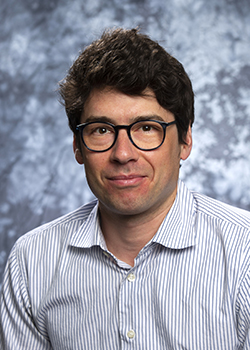 The Department of Nuclear Engineering welcomes Giovanni Pastore to the faculty as a research associate professor. Pastore joins UT after eight years at Idaho National Laboratory.
The Department of Nuclear Engineering welcomes Giovanni Pastore to the faculty as a research associate professor. Pastore joins UT after eight years at Idaho National Laboratory.
He received a bachelor’s degree in physics engineering in 2005, a master’s degree in nuclear engineering in ‘08, and a doctoral degree in radiation science and technology in ’12, all from Polytechnic University of Milan. Pastore has spent year-long visiting scientist assignments at the European Commission’s Joint Research Center (2010-11), the OECD Halden Reactor Project (2015-16) and MIT (2018-19).
“We are thrilled to have Giovanni Pastore join the faculty,” said Postelle Professor, Chancellor’s Professor, and Department Head Wes Hines. “His modeling expertise and experience working internationally will be an asset to our program and will be a bridge to strengthen our relationship with Idaho National Laboratory.”
Pastore’s research deals with modeling the complex in-reactor thermo-mechanical behavior of the nuclear fuel elements. One specific area of his work is the development of models to predict the release of fission gas from nuclear fuel, which is the largest source of uncertainty in engineering-scale nuclear fuel performance codes.
“Among the various aspects of nuclear fuel modeling, fission gas behavior, in particular, has always been fascinating to me,” said Pastore. “More than a decade ago, I learned the sentence in Professor Olander’s famous book on nuclear fuel: ‘Among the myriad phenomena that occur simultaneously in a nuclear fuel element under irradiation, none has so frustrated the designer, so challenged the experimentalist, or so intrigued the theorist as the behavior of the fission products xenon and krypton,’ and ever since, its meaning to me goes on deepening.”
Pastore has developed a fission gas behavior model that is currently being used in multiple nuclear fuel performance codes in the US as well as in the European Union. Other areas of research he has been involved in include modeling light water reactor fuel element behavior during design-basis accidents, oxide fuel behavior at high burnup, and advanced technology fuel and cladding materials technology.